Traditional Filipino Healers and Spiritual Guides
The Babaylan are traditional Filipino healers and spiritual guides who serve as vital connections between the physical and spiritual worlds. They use ancient rituals, herbal remedies, and chanting to promote community healing and unity. For instance, they perform rituals to cleanse the body and mind, and use herbal remedies to treat physical ailments.
Historical Significance and Revival
Historically, the Babaylan faced persecution, but their practices have revived in modern times. This revival promotes cultural identity and indigenous knowledge. Today, the Babaylan continue to play a crucial role in preserving Filipino heritage and cultural traditions.
Inclusive Roles and Wisdom
The Babaylan's roles are inclusive, allowing for diverse expressions of identity. Their wisdom addresses contemporary challenges and advocates for indigenous rights. For example, they provide counseling services to individuals and families, and offer guidance on environmental conservation and sustainable living.
Impact on Filipino Heritage and Community Resilience
The Babaylan have a profound impact on Filipino heritage and community resilience across generations. Their practices foster a sense of community and promote social cohesion. By preserving traditional practices and cultural traditions, the Babaylan help to build stronger, more resilient communities.
Definition and Role of Babaylan
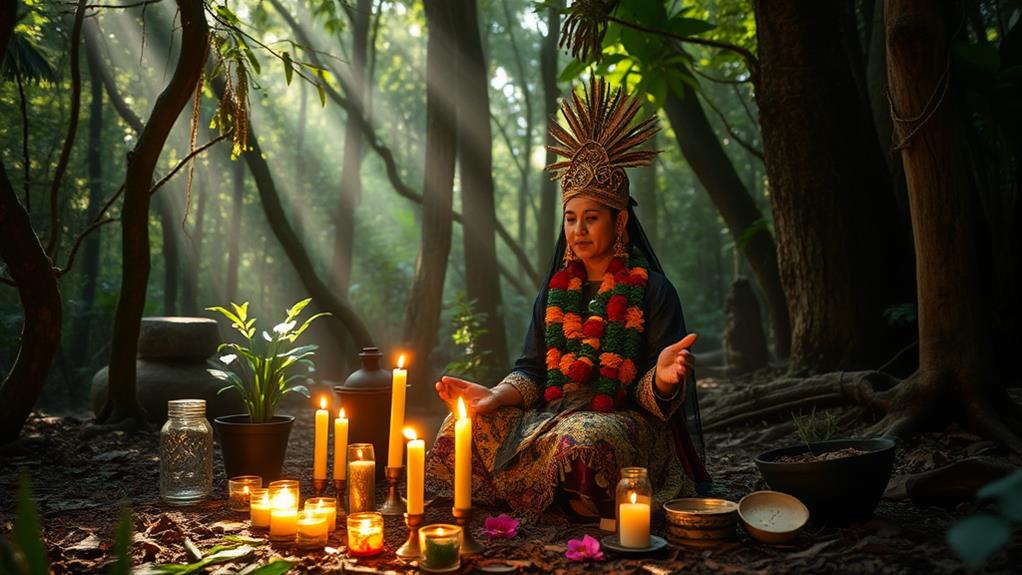
The Babaylan: Spiritual Leaders and Healers
The Babaylan, a vital part of traditional Filipino healing practices, served as both spiritual leaders and healers in pre-colonial society. They mediated between the spiritual and physical worlds, using rituals and healing techniques to address natural and spiritual ailments. Their role extended beyond healing to include conducting community rituals that fostered unity and preserved oral traditions, ensuring the well-being of their communities.
Inclusivity in the Babaylan Tradition
Both men and women could become Babaylan, with a significant number being women, reflecting a matriarchal structure in many indigenous societies. This inclusivity allowed diverse perspectives and practices to thrive, enriching the cultural tapestry of the Philippines.
Babaylan practices incorporated various healing methods, such as chants, herbal remedies, and rituals aimed at communicating with spirits and ancestors.
Preserving Indigenous Knowledge and Cultural Heritage
The Babaylan tradition is crucial for preserving indigenous knowledge and cultural heritage, especially in the face of historical colonization and cultural suppression. By understanding their roles, we gain insight into a rich legacy that continues to resonate in contemporary Filipino culture.
Historical Context and Impact
Babaylan practices have deep roots in ancient Philippine societies. In these societies, Babaylan spiritual leaders and healers played crucial roles in community wellness and guidance. They connected people with powerful spirits, offering healing and wisdom in times of need.
The arrival of Spanish colonizers marked a significant turning point. The traditions of the Babaylan faced severe suppression, leading to the persecution of many practitioners and a profound loss of indigenous cultural practices. This suppression led to a shift in power dynamics, marginalizing Babaylan figures who'd once been revered.
Despite this, many Babaylan emerged as symbols of resistance. They led movements against colonial rule, showcasing resilience amidst oppression. For example, some Babaylan led revolts against Spanish colonizers, fighting for their people's freedom and cultural preservation.
In the late 20th century, Babaylan practices experienced a revival. This resurgence emphasized the importance of cultural identity and the reclamation of indigenous knowledge. It countered modern influences that threatened to erase the cultural heritage of the Filipino people.
Today, understanding the historical context of the Babaylan is crucial, as it reflects not just a struggle for survival but a powerful assertion of cultural continuity within the Filipino identity.
Cultural Significance of Babaylan
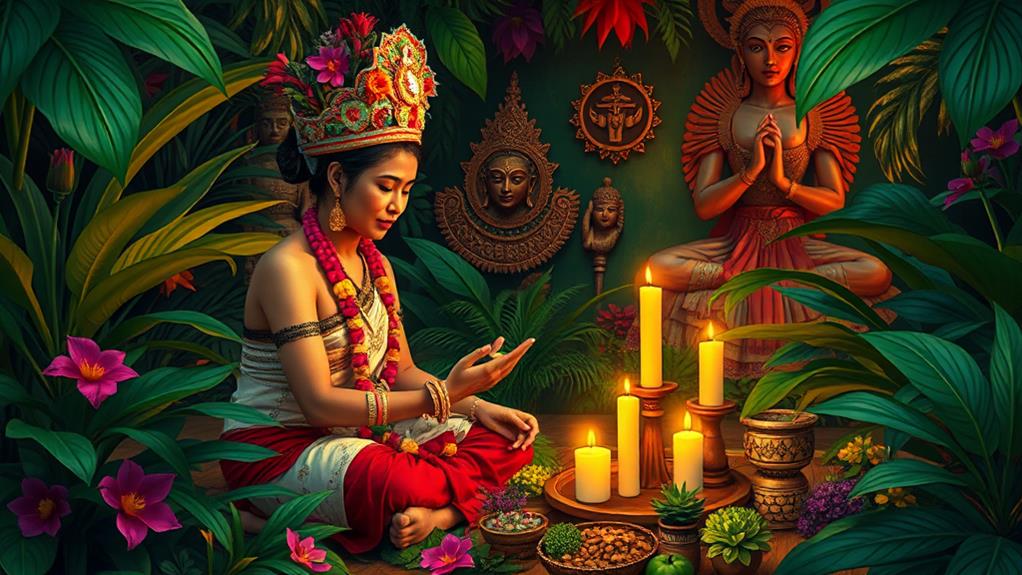
The Babaylan: Guardians of Cultural Significance
In many Filipino communities, the Babaylan hold a profound cultural significance that extends beyond their traditional healing practices.
They serve as vital links between the human and spirit worlds, ensuring spiritual guidance and healing are deeply woven into community life.
Preserving Cultural Identity
The Babaylan conduct rituals that honor ancestors and the spirit world, fostering a sense of belonging within the community.
They embody both feminine and masculine energies, allowing for diverse expressions of identity in their practices.
They emphasize oral histories, ensuring that stories and traditions are transmitted across generations.
Promoting Holistic Health and Wellness
Through their work, the Babaylan promote holistic health and wellness, reinforcing the interconnectedness of body, mind, and spirit.
Historically respected figures, they faced marginalization due to colonization, leading to a cultural loss that contemporary movements strive to reclaim.
Reclaiming Indigenous Knowledge and Community Unity
In revitalizing these practices, a resurgence of indigenous knowledge and community unity is witnessed, reaffirming the Babaylan's indispensable role in maintaining cultural heritage.
Their presence not only honors the past but also shapes the future of Filipino identity and spirituality.
Modern-Day Relevance
The Babaylan's Modern-Day Relevance
Advocating for Indigenous Rights and Cultural Preservation
The Babaylan, traditional Filipino healers, are at the forefront of contemporary wellness movements, advocating for indigenous rights, cultural preservation, and environmental justice. They address pressing social issues like mental health and community healing, taking on leadership roles in their communities.
Integrating Babaylan Teachings into Education
Many Babaylan teachings are now integrated into educational programs, fostering cultural appreciation among younger generations. This integration promotes a deeper understanding of indigenous traditions and their relevance in modern times.
Collaboration and Revitalization of Indigenous Traditions
The collaboration between Babaylan and other cultural or spiritual leaders is crucial for the revitalization of indigenous traditions. This synergy enriches healing practices and amplifies their impact on holistic health.
Local wellness initiatives recognize the efficacy of traditional methods in modern contexts, leading to a greater appreciation for the Babaylan's wisdom.
Honoring the Past, Addressing Contemporary Challenges
By embracing the wisdom of the Babaylan, you're supporting a movement that honors the past while addressing contemporary challenges.
The integration of ancient knowledge into modern frameworks reinforces the ongoing significance of the Babaylan in today's society.
Empowerment Through Tradition
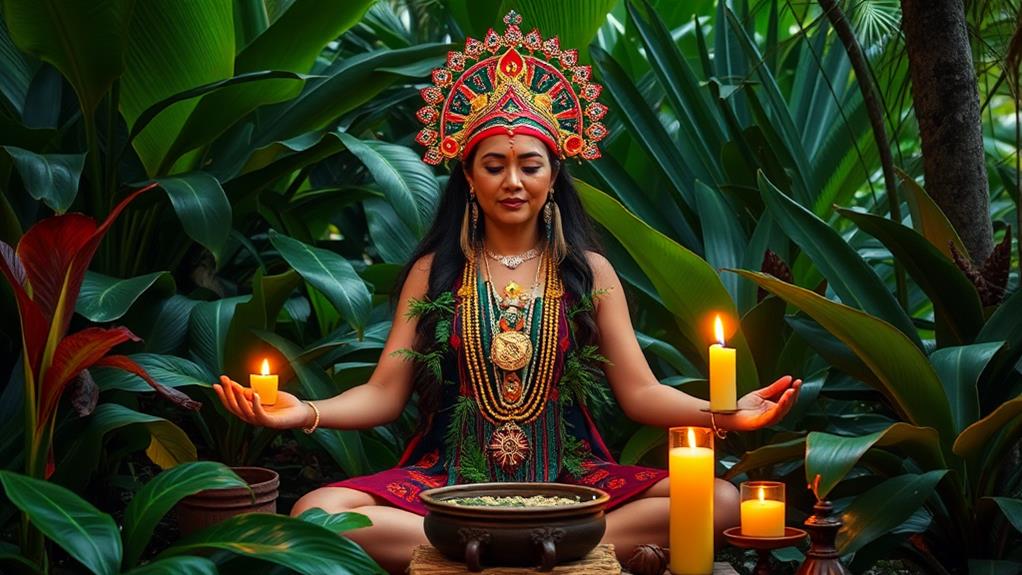
Empowerment through tradition is a vital force in the lives of many Filipinos today, as they reconnect with the rich heritage of their ancestors. By embracing the Babaylan tradition, individuals find guidance from spirit guides, fostering a sense of identity and community. This resurgence promotes resilience and collective empowerment, particularly in the face of modern challenges.
Cultural Heritage is a key aspect of empowerment through tradition. For example, people are integrating traditional practices into contemporary activism, advocating for social justice and cultural preservation. This integration helps to preserve cultural identity and promote social change.
Holistic Healing is another important aspect of empowerment through tradition. The Babaylan's role as spiritual guides emphasizes wellness, encouraging practices rooted in ancestral wisdom that promote mental, emotional, and physical health.
For instance, traditional healing practices like meditation and herbal remedies are being used to address modern health issues.
Identity Reclamation is also a crucial aspect of empowerment through tradition. Through rituals and community engagement, individuals can reclaim their personal and cultural narratives, allowing them to freely marry their past with their present.
This reclamation helps individuals to assert their cultural identity and pride.
As individuals delve into these practices, they contribute to a broader movement toward decolonization, asserting their cultural identity. The Babaylan tradition offers a pathway to empowerment, inviting individuals to honor their roots while navigating the complexities of modern life.
Decolonization and Healing
Decolonization and Healing: A Vital Journey
Decolonization and healing are intricately connected for many Filipinos, allowing them to reclaim their cultural identity and heritage. This transformative process involves confronting the traumas inflicted by colonization, which fosters a deeper connection with ancestors and spirits.
Confronting Traumatic Memories
By recovering traumatic memories linked to activism, individuals and their communities can collectively address historical injustices, paving the way for a more empowered future.
For example, understanding the impact of Spanish colonization on indigenous practices helps individuals confront the erasure of their cultural heritage.
Embracing Babaylan Traditions
Engaging with Babaylan traditions amplifies the healing journey by emphasizing the importance of preserving indigenous knowledge.
Healing isn't just personal; it's a communal promise and hope for future generations. By exploring these practices, individuals can redefine their cultural narratives and identities, leading to a stronger sense of community and cultural identity.
Empowerment through Cultural Reclamation
Embracing Babaylan traditions reinforces cultural identity against the backdrop of colonial history.
This journey empowers individuals and strengthens their communities, ensuring that the wisdom of their ancestors and spirits continues to guide them on the path of reclamation and renewal.
Community Engagement and Events
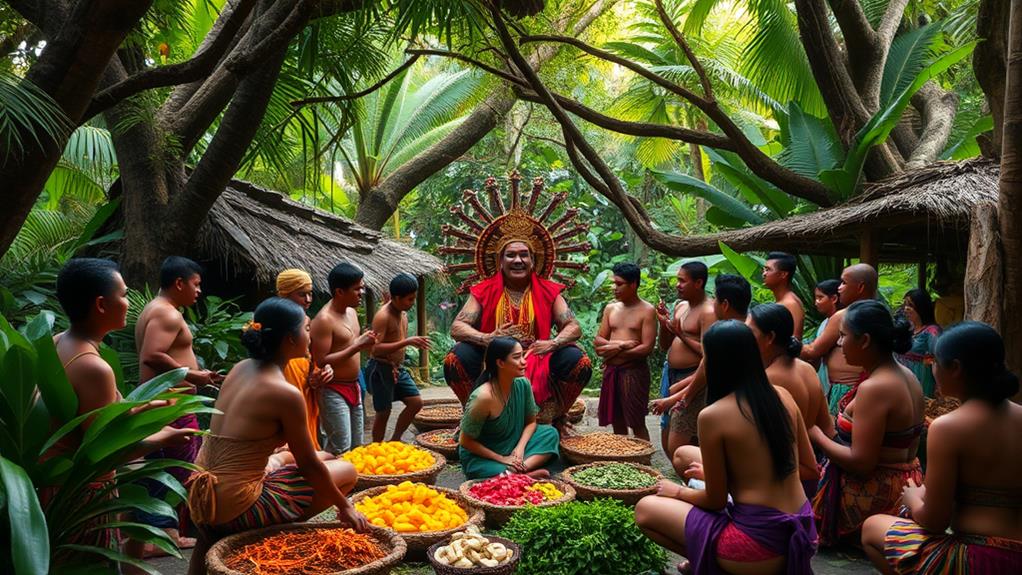
Connecting with Cultural Heritage through Community Events
Participating in community events rooted in Babaylan wisdom offers a powerful way to connect with cultural heritage while fostering collective healing. These events create vibrant spaces where individuals can immerse themselves in traditional healing rituals and learn invaluable ancestral knowledge.
The Center for Babaylan Studies (CfBS) organizes events that allow individuals to experience:
Healing rituals that integrate ancient practices with contemporary issues, promoting both individual and collective wellness. For example, these rituals may address modern concerns such as stress management and mental health.
Workshops that deepen understanding of Babaylan traditions, equipping individuals to share these insights within their community. These workshops may cover topics like traditional herbal medicine and spiritual practices.
Cultural celebrations that honor the Babaylan's role in Filipino heritage, fostering a sense of identity and belonging. These celebrations may include traditional music, dance, and food.
By participating in these events, individuals contribute to the preservation and revitalization of Babaylan traditions, ensuring they remain a vital part of the cultural landscape.
Their involvement can spark awareness and inspire others, creating a ripple effect of healing and empowerment within the community.
How Do Babaylans Play a Role in Filipino Healing Traditions and Practices?
Babaylans are integral to Filipino healing traditions practices. These spiritual leaders conduct rituals and use traditional herbal remedies to heal physical and spiritual ailments. Their role is rooted in the belief that connection to ancestral spirits is essential for maintaining wellness in the community.
Terminology and Linguistic Insights
Language and Filipino Healing Traditions
The Babaylan: A Mediator Between Realms
In Filipino healing traditions, the term babaylan originates from Proto-Western-Malayo-Polynesian *balian*, signifying a mediator between the physical and spiritual realms. This term is often associated with traditional healers who connect with spirits.
Alternative Terms and Their Significance
Other terms, such as catalonan, directly relate to communication with spirits, highlighting the depth of these healers' roles. catalonan is rooted in Tagalog and emphasizes dialogue.
Key Terms Associated with the Babaylan
The following table summarizes key terms associated with the babaylan:
| Term | Meaning | Notes |
|---|---|---|
| Babaylan | Traditional healer & mediator | Often female, connects with spirits |
| Catalonan | Communicator with spirits | Rooted in Tagalog, emphasizes dialogue |
| Asog/Bayok | Male counterparts | Often feminized, embody spiritual roles |
Colonization and Its Impact on Terminology
The evolution of terminology reflects not only linguistic shifts but also historical contexts. Colonization introduced negative connotations, altering perceptions of gender and spirituality. Understanding these terms enriches our appreciation for the babaylan and their vital connections to spirits and deities, illustrating the complexity of their cultural significance.
Spiritual Practices and Beliefs
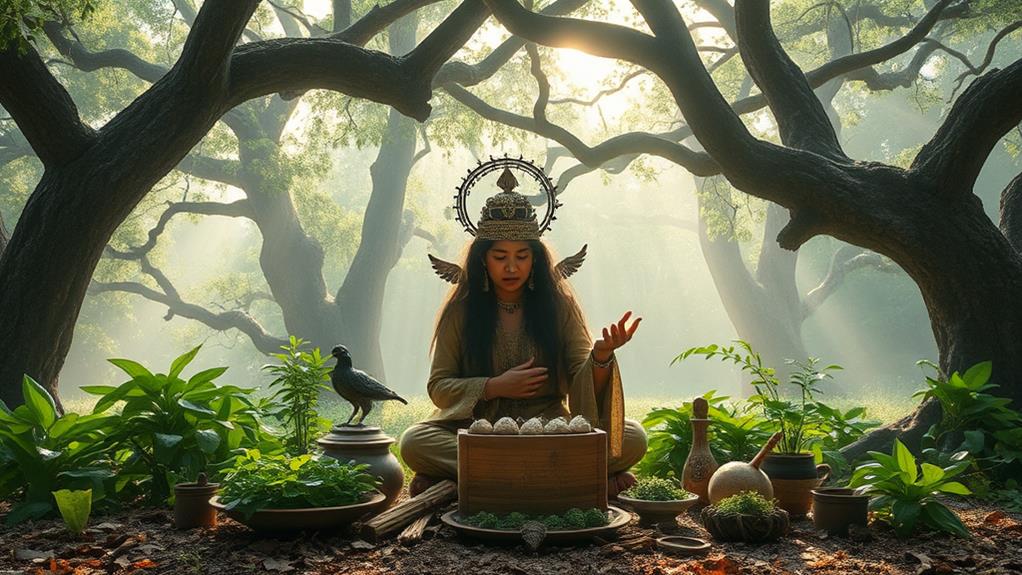
The Spiritual Practices and Beliefs of the Babaylan
The babaylan's spiritual practices and beliefs are deeply rooted in their connection with the spirit world.
They act as mediators, invoking ancestral spirits to provide divine guidance and healing for individuals and the community.
Their rituals are designed to counteract the effects of malevolent spirits and are rich in symbolism and purpose.
Three key elements of their spiritual practices are:
- Unique Songs and Chants: Each babaylan uses specific songs passed down through generations to facilitate communication with the spiritual realm.
- Ceremonial Invocations (Daging): These rituals seek divine assistance, emphasizing a strong communal bond in the healing process.
- Trance States (Paramag): Induced during rituals, these states allow the babaylan to deepen their connection with the spiritual world, enhancing their ability to heal.
Through these practices, the babaylan address physical and emotional ailments, fostering a sense of unity and spiritual strength in their communities.
Questions and Answers
What Is a Babaylan Spirit Guide?
A babaylan spirit guide, also known as an Abyan, represents the bridge between the spiritual realm and healing practices.
This guide plays a crucial role in rituals, communicating vital insights to help navigate challenges.
To maintain a strong connection with your spirit guide, regular offerings are essential, ensuring harmony and support.
What Is a Babaylan in the Philippines?
In the Philippines, a babaylan is a traditional healer and spiritual leader deeply rooted in history. These spiritual leaders practice healing rituals, invoke spirits, and guide their communities.
Historically, babaylan were predominantly women, embodying both feminine and masculine energies. They played vital roles in pre-colonial societies, preserving indigenous knowledge and cultural heritage.
Today, there's a revival of babaylan traditions, which emphasize cultural identity and community healing against colonial legacies. This revival aims to reconnect people with their cultural roots and promote community well-being.
Who Are the Traditional Healers in the Philippines?
Traditional healers in the Philippines play a vital role in preserving indigenous healing practices. These healers, often respected within their communities, use age-old techniques and rituals to address physical and emotional ailments.
Their methods combine spirituality and medicine, which involves engaging with nature and spiritual entities to foster a deep connection to their heritage.
These healers are important cultural preservers, as they keep ancestral knowledge and community identity alive.
For example, they use herbal remedies and rituals to treat illnesses, such as fever, cough, and diarrhea.
They also perform rituals to ward off evil spirits and bring good luck. By doing so, they ensure that these practices endure amidst modern challenges.
What Are the Rituals Performed by the Babaylan?
Babaylan rituals involve spiritual cleansing ceremonies where chants and songs are used to invoke ancestral spirits, creating a profound connection between the healer and the divine.
These ceremonies often induce trance states, which enhance the spiritual experience for everyone involved.
Community participation is vital in these rituals, as it fosters collective healing and addresses both individual and communal needs through deeply rooted traditions.